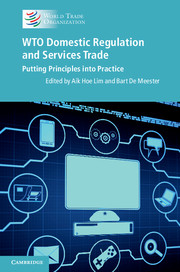Book contents
- Frontmatter
- Contents
- List of contributors
- Foreword
- Disclaimer
- Acknowledgements
- List of abbreviations
- 1 An introduction to domestic regulation and GATS
- Part I Impediments to services trade, regulatory theory and principles
- Part II Legal perspectives on WTO principles and domestic regulations
- Part III Case studies
- 8 Legal services in the United States
- 9 Telecommunications reform in China: fostering competition through state intervention
- 10 Information communications technology: the Mauritian experience of regulation and reform
- 11 Regulation of postal services in a changing market environment: lessons from Australia and elsewhere
- 12 Mobile money services provision in East Africa: the Ugandan experience
- 13 Financial services liberalization and regulation in Japan: implications for future negotiation on market access and domestic regulations
- 14 Domestic regulations in Malaysia’s higher education sector
- 15 Domestic regulations and India’s trade in health services: a study of hospital and telemedicine services
- 16 Operating integrated logistics services in a fragmented regulatory environment: what is the cost?
- 17 Domestic regulation of retail food distribution services in Israel: the missing link between food prices and social protest
- 18 Regulatory impact analysis: addressing the trade and regulatory nexus
- Part IV Concluding remarks
- Index
- References
10 - Information communications technology: the Mauritian experience of regulation and reform
Published online by Cambridge University Press: 05 April 2014
- Frontmatter
- Contents
- List of contributors
- Foreword
- Disclaimer
- Acknowledgements
- List of abbreviations
- 1 An introduction to domestic regulation and GATS
- Part I Impediments to services trade, regulatory theory and principles
- Part II Legal perspectives on WTO principles and domestic regulations
- Part III Case studies
- 8 Legal services in the United States
- 9 Telecommunications reform in China: fostering competition through state intervention
- 10 Information communications technology: the Mauritian experience of regulation and reform
- 11 Regulation of postal services in a changing market environment: lessons from Australia and elsewhere
- 12 Mobile money services provision in East Africa: the Ugandan experience
- 13 Financial services liberalization and regulation in Japan: implications for future negotiation on market access and domestic regulations
- 14 Domestic regulations in Malaysia’s higher education sector
- 15 Domestic regulations and India’s trade in health services: a study of hospital and telemedicine services
- 16 Operating integrated logistics services in a fragmented regulatory environment: what is the cost?
- 17 Domestic regulation of retail food distribution services in Israel: the missing link between food prices and social protest
- 18 Regulatory impact analysis: addressing the trade and regulatory nexus
- Part IV Concluding remarks
- Index
- References
Summary
Introduction
This chapter presents the evolution of the information and communications technology (ICT) sector in Mauritius and the advances made in defining clear institutional, policy, legal and regulatory frameworks which have positively influenced trade in the ICT services. The case study analyses the pre-existing conditions that facilitated competition in telecommunications thus paving the way to making ICT a key pillar for the development of the Mauritian economy through its Cyber Island Strategy. The study also reviews the prominent role played by the sector ministry and the ICT regulator in fostering widespread application of modern technologies and reporting on the ensuing economic benefits for the country.
The ICT sector definition for Mauritius conforms to the recommendations of the United Nations (ITU 2010) to ascertain a scientific measurement of sector outputs. It thus includes manufacturing and services industries whose products capture, transmit or display data and information electronically. It comprises wholesale and retail trade, communications, business services such as call centres, software development, website development and hosting, multimedia, IT consulting and disaster recovery centres. Since 2008, ICT training has been excluded from the definition.
- Type
- Chapter
- Information
- WTO Domestic Regulation and Services TradePutting Principles into Practice, pp. 159 - 180Publisher: Cambridge University PressPrint publication year: 2014

